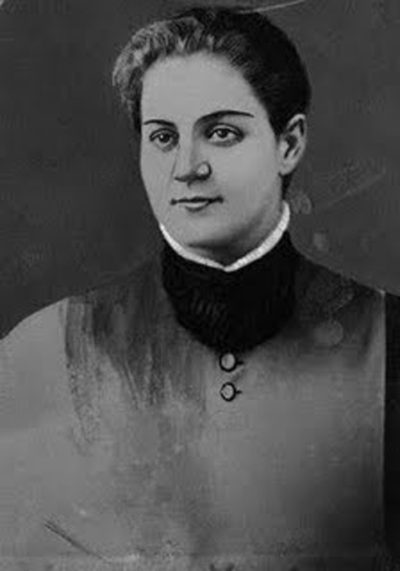Jane Toppan (Honora Kelley)

Though scant records survive of Jane Toppan’s early years, it is known that her parents were Irish immigrants, and her mother, Bridget Kelley, died of tuberculosis when she was very young. Her father, Peter Kelley, was well known as an alcoholic and eccentric, nicknamed by those who knew him “Kelley the Crack” (crack as in “crackpot”). In later years Kelley would become the source of many local rumors concerning his supposed insanity, the most popular of which being that his madness finally drove him to sew his own eyelids closed while working as a tailor. In 1863, only a few years after his wife’s death, Kelley took his two youngest children, the eight-year-old Delia Josephine and six-year-old Honora, to the Boston Female Asylum, an orphanage for indigent female children founded in 1799 by Mrs. Hannah Stillman. Kelley surrendered the two young girls, never to see them again. Documents from the asylum note that the two girls were “rescued from a very miserable home”. No records of Delia and Honora’s experiences during their time in the asylum exist, but in less than two years, in November 1864, Honora Kelley was placed as an indentured servant in the home of Mrs. Ann C. Toppan of Lowell, Massachusetts. Though never formally adopted by the Toppans, Honora took on the surname of her benefactors and eventually became known as Jane.
In 1885, Jane Toppan began training to be a nurse at Cambridge Hospital. During her residency, she used her patients as guinea pigs in experiments with morphine and atropine; she would alter their prescribed dosages to see what it did to their nervous systems. However, she would spend a lot of time alone with those patients, making up fake charts and medicating them to drift in and out of consciousness and even getting into bed with them. It is not known whether any sexual activity went on when her victims were in this state but when Jane Toppan was asked after her arrest, she answered that she derived a sexual thrill from patients being near death, coming back to life and then dying again. Toppan would administer a drug mixture to patients she chose as her victims, lie in bed with them and hold them close to her as they died. This is quite uncommon for female serial killers, who usually murder for material gain and not sexual satisfaction. She was recommended for the prestigious Massachusetts General Hospital in 1889; there, she claimed several more victims before being fired the following year. She briefly returned to Cambridge but was soon dismissed for prescribing opiates recklessly. She then began a career as a private nurse and flourished despite complaints of petty theft.
Jane Toppan began her poisoning spree in earnest in 1895 by killing her landlords. In 1899, she killed her foster sister Elizabeth with a dose of strychnine. In 1901, Toppan moved in with the elderly Alden Davis and his family in Cataumet to take care of him after the death of his wife (whom Toppan herself had murdered). Within weeks, she killed Davis and two of his daughters. She then moved back to her hometown and began courting her late foster sister’s husband, killing his sister and poisoning him so she could prove herself by nursing him back to health. She even poisoned herself to evoke his sympathy. The ruse did not work, however, and he cast her out of his house. The surviving members of the Davis family ordered a toxicology exam on Alden Davis’ youngest daughter. The report found that she had been poisoned, and local authorities put a police detail on Toppan. On October 29, 1901, she was arrested for murder. By 1902, she had confessed to 31 murders. On June 23, in the Barnstable County Courthouse, she was found not guilty by reason of insanity and committed for life in the Taunton Insane Hospital. Soon after the trial, one of William Randolph Hearst’s newspapers, the New York Journal, printed what was purported to be Jane Toppan’s confession to her lawyer that she had killed more than 31 people and that she wanted the jury to find her insane so she could eventually have a chance at being released. Whether or not that was truly Toppan’s intention is unknown. She remained at Taunton for the rest of her life.
Born
- January, 01, 1857
- USA
- Boston, Massachusetts
Died
- January, 01, 1938
- USA
- Boston, Massachusetts
Cemetery
- Mayflower Hill Cemetery
- Taunton, Massachusetts
- USA

